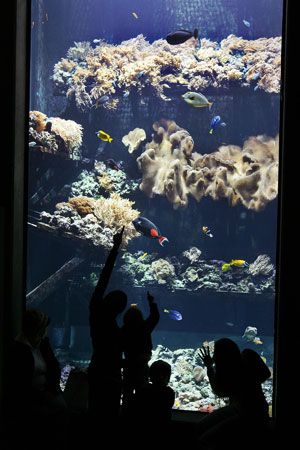 Coral reefs, often referred to as underwater rainforests, are the most diverse aquatic ecosystem on the planet. Often mistaken as underwater plants, coral are actually animals related to anemones and jellyfish. A reef can be made up of many different types of coral colonies and be thousands of years old. Each branch or part of is made up of hundreds to thousands of individual animals known as coral polyps. Like anemones, coral polyps are asexual and can produce identical copies to create a coral colony.
Coral reefs, often referred to as underwater rainforests, are the most diverse aquatic ecosystem on the planet. Often mistaken as underwater plants, coral are actually animals related to anemones and jellyfish. A reef can be made up of many different types of coral colonies and be thousands of years old. Each branch or part of is made up of hundreds to thousands of individual animals known as coral polyps. Like anemones, coral polyps are asexual and can produce identical copies to create a coral colony.
Coral reefs are also the most threatened ecosystems in the ocean-- up to 70% of the world's tropical coral reefs may disappear within the next 15 years due to the impacts of global warming and other environmental stresses. Worldwide, over 25% have already been destroyed or badly damaged. These ecosystems are important to save, not only because of the biodiversity they contain, but because they provide protection for coastal communities against tropical storms, hurricanes and typhoons.
Because of their ability to duplicate themselves, it is possible to recreate reefs without collecting specimens from threatened reefs. For the past few years, a coral reef has been grown and maintained at 875 Howard Street. In one tank, which measures 18 feet deep, Academy biologists have grown corals on adjustable racks to determine which species grow best at different depths. This 20,000-gallon experimental tank holds about 200 square feet of living corals, as well as several hundred reef fish. Additionally, the Academy recently installed 46 smaller tanks that are dedicated to the coral rearing program. These tanks, called "coral rearing pods," are actually agricultural bins that have been fitted out with life support systems in order to rear new coral colonies.
The coral colonies reared and grown at 875 Howard will be moved to the new Academy early next year to a 212,000-gallon tank. This new tank will hold a variety of delicate soft and hard corals, as well as sharks, rays, and more than 4,000 colorful reef fishes. The tank will be a diverse and beautiful example of a coral reef created sustainably from captive bred specimens. Academy scientists will use the tank as a resource for their scientific studies and to educate the public about the importance of research and conservation of these rain forests of the sea.
![]() Cat Aboudara is the Special Projects Manager at California Academy of Sciences and works in the public programs division. The Academy is a wonderful fit for her because of her curiosity about the natural world and her experience in working with native California wildlife.
Cat Aboudara is the Special Projects Manager at California Academy of Sciences and works in the public programs division. The Academy is a wonderful fit for her because of her curiosity about the natural world and her experience in working with native California wildlife.
